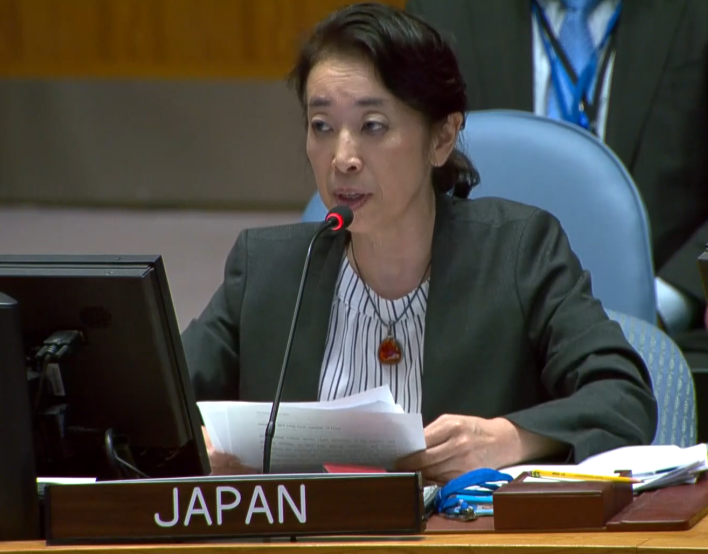国連ハイチ統合事務所(BINUH)及び制裁に関する安保理会合における志野大使ステートメント
令和5年7月6日

(As delivered)
Thank you, Mr. President.
I thank SRSG Ms. Salvador for her insightful briefing. I also thank Ms. Gilles for her enlightening statement. I extend a warm welcome to Prime Minister of Jamaica on behalf of CARICOM, Mr. Holness, Foreign Ministers of Haiti Mr. Geneus and Foreign Minister of the Dominican Republic Mr. Alvarez as well as the Permanent Representative of Barbados.
I also thank Ambassador Biang, the chair of the sanction committee for his briefing. Japan takes note of the desire expressed by many actors in favor of an expansion of the sanction list.
Haiti continues to face multifaceted challenges including violence, corruption, human rights abuses, and health and economic crises. In this regard, Japan appreciates BINUH’s efforts in supporting Haiti’s endeavor to restore security, strengthen the rule of law, and promote respect for human rights. We also welcome BINUH’s collaboration with relevant stakeholders, including the Office of the High Commissioner for Human Rights (OHCHR), notably in its recent anti-corruption efforts. Such a holistic approach is essential in tackling the interrelated root causes of Haiti’s struggles. As the role BINUH plays for peace and security in Haiti remains essential, Japan fully supports the extension of its mandate which is due to end on the 15th of July. My delegation will constructively engage in the mandate negotiation to allow BINUH to continue its operations effectively.
At the same time, BINUH’s work can only complement Haitian-led efforts. Japan welcomes the Haitian Government’s efforts to implement the National Consensus Agreement for an inclusive transition and transparent elections. While acknowledging the forum organized by the High Council of the Transition, we strongly encourage the Government to take further actions to intensify the forging of a broader consensus to the agreement through dialogue among all Haitian actors. Elections must be conducted in a free, fair, and transparent manner with inclusive participation for the medium- and long-term stability of Haiti.
Institutional reform across Haiti, especially in the security and judicial sectors, is also key. Strong, effective, and trusted institutions are essential to combating corruption and impunity. Japan recognizes the call to strengthen and assist the Haitian National Police (HNP), including the possible deployment of a non-UN specialized international force. Japan, for its part, will continue its support through bilateral and multilateral initiatives, such as the UN Basket Fund.
The active involvement by regional organizations is also commendable. The recent meetings of the Organization of American States (OAS) and the Caribbean Community (CARICOM) have reaffirmed their significant engagement in Haiti’s security, democracy, promotion and protection of human rights, and holding of free and fair elections as soon as possible.
Last May, at the G7 Hiroshima Summit, leaders reiterated their commitment to strengthen coordination with Latin American and Caribbean partners and other actors to meet Haiti’s humanitarian and security needs. This was further emphasized by our State Minister for Foreign Affairs when he met with the Haitian Foreign Minister, His Excellency Mr. Geneus, in May and expressed Japan’s continuous support to Haiti in coordination with international and regional partners towards the stabilization of the country.
Let me conclude by reiterating Japan's unwavering support for and solidarity with the people and the Government of Haiti as they pursue their Haitian-led solutions.
I thank you, Mr. President.
